this is part 3 of a series on mental disabilities – for more, check out i have Tourette’s and my OCD.
Insomnia is my pillow’s greatest enemy. history nerds recognize:
“One man’s terrorist is another man’s freedom fighter.”
well, one man’s bed is another’s terrorist; i haven’t slept before midnight in years.
while living in San Francisco, 2016, i actually did a 10-day experiment…
- sleep at 4a,
- wake at 8a,
- rinse, repeat
… just to prove i could.
why?
if you’re wondering why I have insomnia, my answer is different from a doctor’s.
is it unlimited energy, or anxiety? boredom, or insecurity? curiosity, or caffeine?
whatever the reason, i’ve learned that understanding and managing Insomnia is more important than trying to cure it.
but first, a story.
sources of Insomnia
my childhood was decent, but i lived in a strict household: early curfews, spankings, correcting homework with wrong answers, chores, yada yada yada.
while this is standard stuff, what’s unique is the disproportionate punishment i received for not following the rules.
for example…
in elementary school my mom gave me a Timex watch, with a 5:25p alarm. since i usually hung out in a nearby park, this gave me 5 minutes post-beep to walk home on-time for dinner. on several occasions i was late.
the punishment? being sent to bed immediately after dinner, at 6p, while the sun shines outside, breaking through the cracks in my blinds.
i still remember those days: lying in bed, wide awake, bedroom bright as hell, hearing my friends laughing and playing baseball.
in fact, this memory alone is why i don’t take naps. worse still, the mere thought of sleeping in the daytime makes me sick to my stomach.
does this [no longer repressed] memory contribute to my inability to sleep at night?
maybe.
is Insomnia bad
my vote: mostly yes.
here’s an average person’s day:
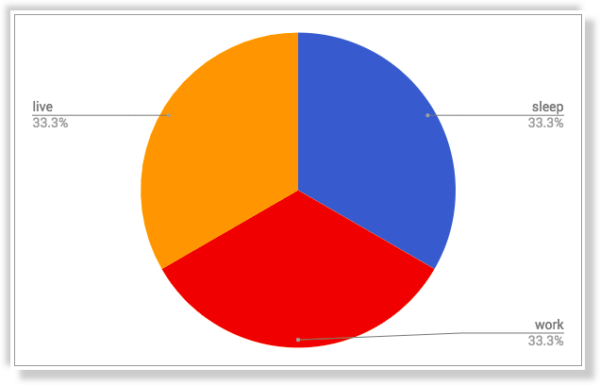
eight hours each toward sleeping, working, and living (errands, friends, etc).
for insomniacs, it’s like this:
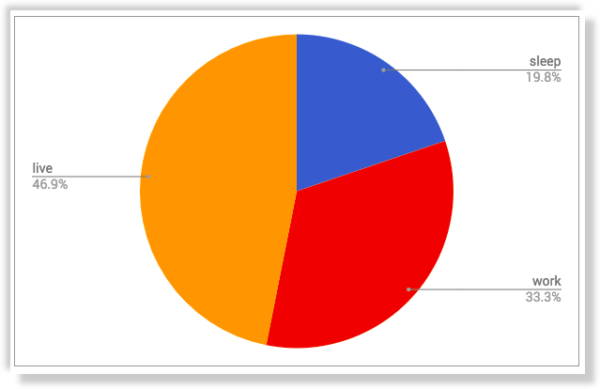
don’t let the “more life” area fool you, however.
since insomniacs often describe themselves as walking zombies, bonus time outside a balanced sleep/work cycle is low quality, and ill-spent.
is Insomnia good
my vote: sometimes yes.
because here’s where it gets interesting: the intersection of insomnia and ambition.
my personal routine:
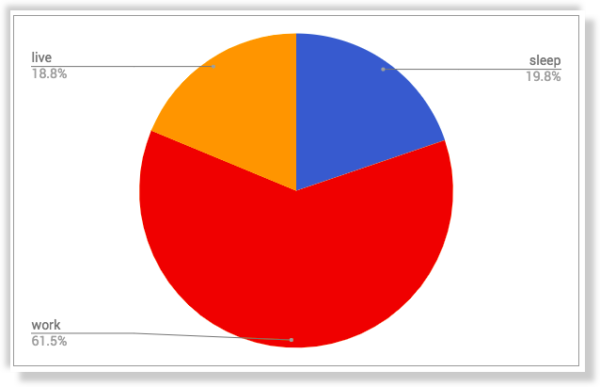
now the data:
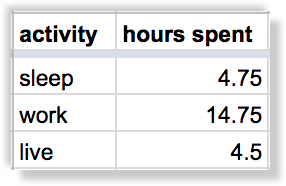
for ambitious insomniacs, time not spent sleeping moves from the “live” category to the “work” category.
(context: i’m sipping coffee at a cafe in Los Angeles right now, at 10p on a Friday. before walking here i ate 3 pieces of lunch meat for dinner over my kitchen sink.)
this isn’t to say insomniacs have an affection for work, just that we have the energy and time to do it.
benefits of Insomnia
i’m often asked “how do you get so much done?” or told “i’m too busy to do what you do!”
even folks who have accomplished incredible things, share the sentiment:
This is great, from the most productive person I know. https://t.co/R1f5FhNDn9
— Justin Mares (@jwmares) September 8, 2017
this productivity delta between ambitious regulars and ambitious insomniacs grows exponentially when considering Man’s greatest weapon against failure:
the weekend.
secret: i’ve worked every Saturday and Sunday for the past 1.5 years, which adds 18-28 hours of productivity per week — or, 2 full-time work weeks per month.
what could you accomplish with 2 weeks off per month? would you finally write that book? learn to code? maybe create an online course for a niche skill?
well, you can take 2 weeks off per month, beginning now, without your boss’ permission. just set your alarm for 9a this Saturday.
tl;dr – Insomnia is a Superpower.
how to know if you have Insomnia
a few heuristics with which to self-diagnose:
- after shutting down the computer and going to bed, you have a nagging compulsion to “finally reply to that email,” and then you actually get back out of bed to do it
- you sometimes sleep on top of the bed vs under the covers, because it doesn’t feel any less comfortable
- coffee is God’s gift, you spend more cash on coffee than food, or your brain doesn’t function until you’ve had your daily dose
- every night when going to bed, you note the time and calculate “sleep potential” (i give my girlfriend daily updates, ie: last night i got 5.25 hours of sleep, not bad!)
- sometimes you feel tired after dinner, then a “2nd wind” hits and by 11p you’re just as awake as 12 hours ago
notice what is not included:
- being grumpy
- unwillingness to get out of bed
these are symptoms of depression, or someone who “lives for the weekend” (see: lacks purpose).
dealing with Insomnia
according to Google, there is no cure for Insomnia.
yes, there are sleeping medications, but those can be addicting.
yes, there are apps that remove the Blue Screen Effect and there are tactics like “no coffee after lunch” or “no TV after 8pm.” but Insomnia isn’t a technology reaction, it’s a chemical reaction.
my advice for those dealing with extra hours in the day – err, late night – is to embrace your differences and become an explorer.
imagine you’re on another dimension, alone and without distractions. without a clock to punch, or a boss to email-back-quickly, or a meal to cook.
let your mind wander.
take online courses. educate yourself on current events.
click around Google maps of remote places, trying to memorize the proximity of cities you’ve always heard of but never been to. i do this all the time.
pop quiz: do you know where Tuscany is, in relation to Rome? What about Venice? is it a few hours’ drive north? can you take a train?
learn party tricks, like how to tongue-tie a cherry stem knot. write a poem.
acknowledge that the 4th dimension is TIME, and that your daily routine is an unfair advantage.
i’ve built entire companies in the 4th dimension.
i thwart my competitors while they’re having bad dreams about me.
i do pushups after deploying features at 2am. i count calories in MyFitnessPal and plan tomorrow’s diet at midnight.
possibilities are endless.
what’s next
in Duckworth’s Grit, her main point is not that “grit is good, it makes us more successful.” duh!
what she argues is that Grit can be learned; that anyone can develop a fierce sense of purpose and a vigilant attitude toward everything they do.
so while sleeping may or may not be your jam, i challenge you to shuffle a few hours around in your sleep-work-live cycle.
because if your legacy depends on 33% of your time being spent on the “right stuff…”
… good luck.
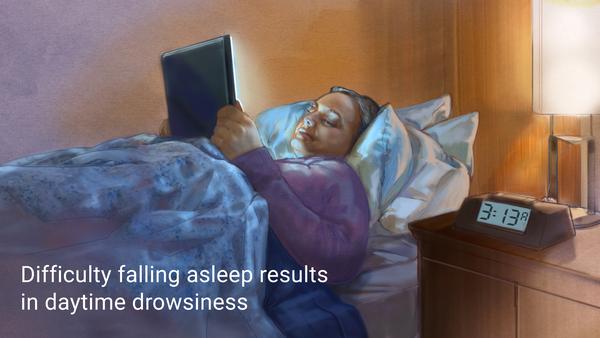
Love this post, you’re an animal bro. One big thing about the grit hypothesis – that runs contrary to some of this post – is focus.
If you have a bunch of goals without overlap, that’s probably nongritty. You’d be the one to prove that wrong though.
thanks Conrad. i don’t disagree w/ focus parameter, but we shouldn’t assume multiple projects equivocates to lack of focus, either.
indeed, if the scope* of those projects is trimmed, focus can be shared.
I love this post. Insomnia almost feels like something I wish I had :)
Great point on weekends too. I spend my weekends working and doing stuff because I love what I do – nothing to escape from. And it’s certainly helped me get ahead career wise.
great article. unfortunately, i’m in the rest of the population who needs sleep to function. but since work product = time * productivity, i get things done by maximizing my limited awake time.
insomnia is definitely a superpower.
Great blog post back then and still is.
I’m wondering if your described insomnia is just a strong form of delayed sleep phase disorder.
Maybe this blog post helps people around here who struggle with sleep: https://www.lesswrong.com/posts/E4cKD9iTWHaE7f3AJ/melatonin-much-more-than-you-wanted-to-know
And finally – a cure:
https://www.theguardian.com/news/2018/sep/14/finally-a-cure-for-insomnia